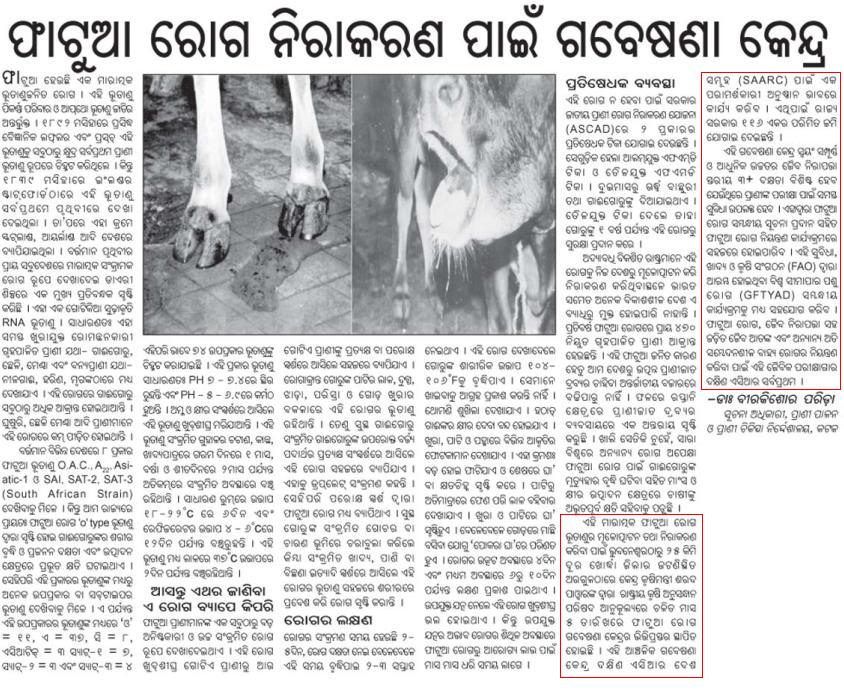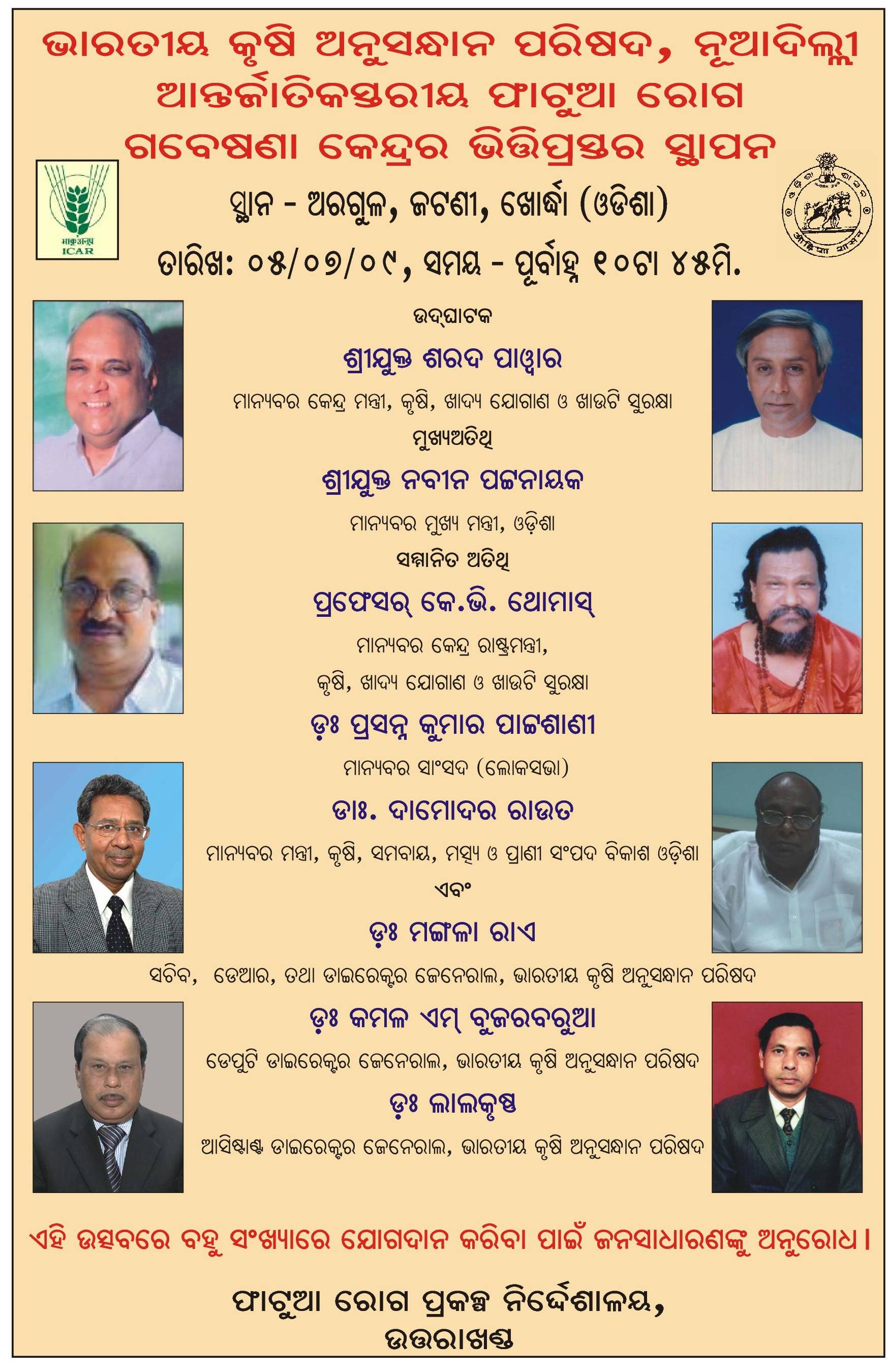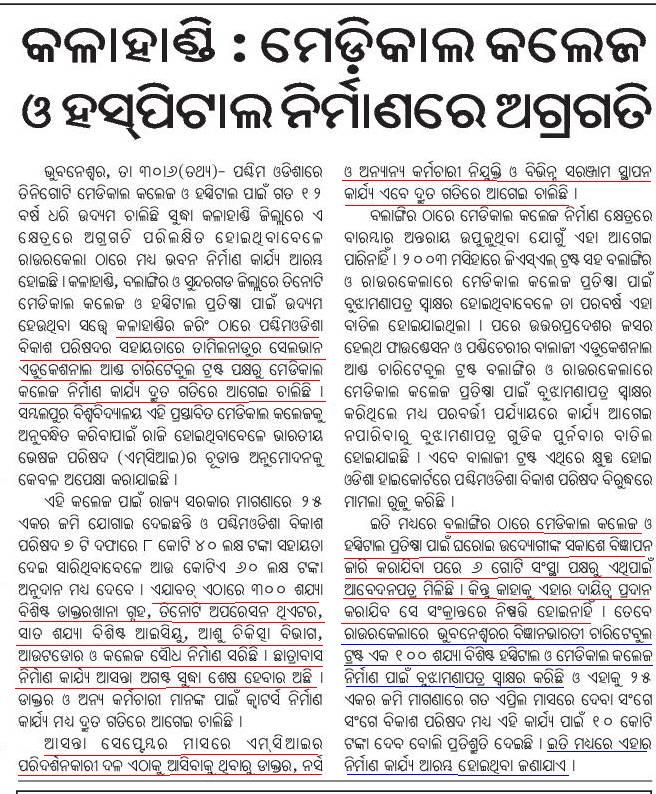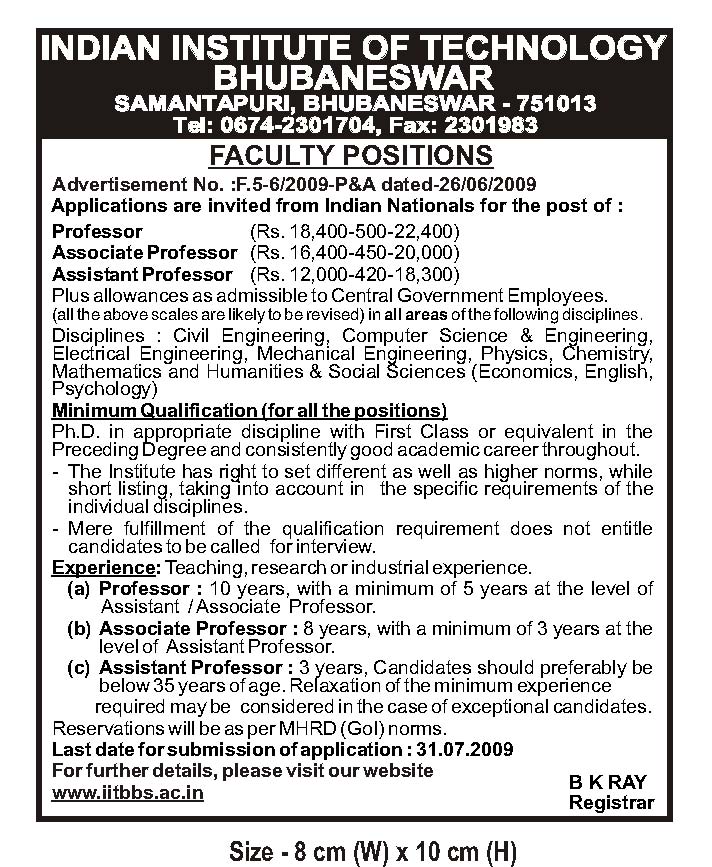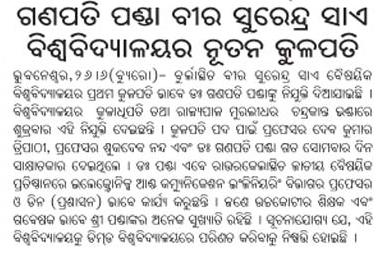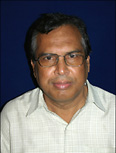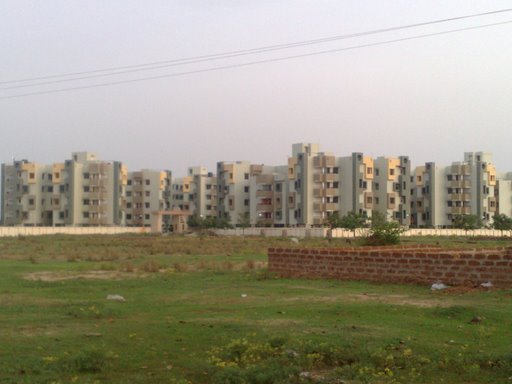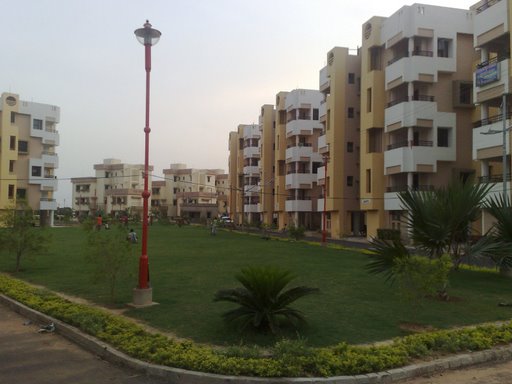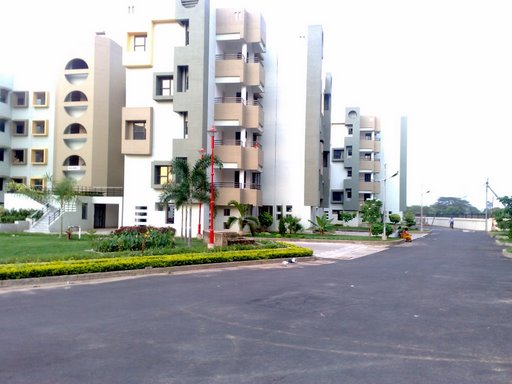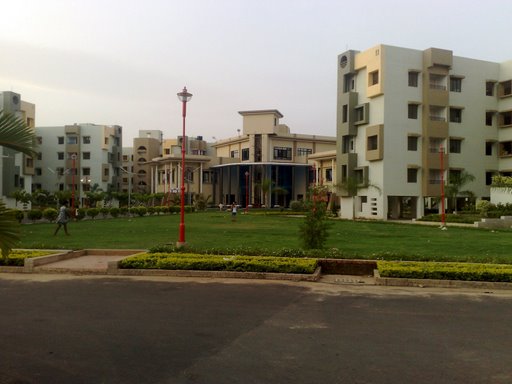NOTE: Please note that I am in the board of advisors of BIT. I agreed to join the board because I believe in the people who are making it. Nevertheless I am obviously biased.
The above statement is made in a report about Bhubaneswar Institute of Technology in Pioneer. Some excerpts from that report are:
A group of likeminded eminent NRO academicians have come together to start the Bhubaneswar Institute of Technology (BIT) and offer students of the State the opportunity for technical education and research of international standard and style. The institute promises its students education by experienced faculty from the US, innovative teaching methods and much more within the framework of the BPUT curriculum.
… There would also be opportunities for students to “Earn while Learn,” “Learn While You Teach” and the top five students would be provided opportunities in the US for higher studies and research, he said. The BIT hopes to achieve all this through its experienced faculty, both visiting and permanent, from places like the US, Canada and Singapore.
I beleive that the above promise would be honored. That is because:
- The BIT founders include several professors in the USA, two of whom (Prof. Laxmi Bhuyan and Prof. Prasant Mohapatra) are Chairmen of their departments at University of Califoirnia at Riversive and University of California at Davis respectively.
- The top students from Orissa are as good as from any other state in India and thus many US universities would love to take them as graduate students and they will believe the quality of these students when these students submit recommendation letters written by professors in the US who know the students closely because of their association with BIT.
BIT’s initial faculty recruitment is also showing their commitment to quality. Its current faculty of thirteen has four Ph.Ds, two doing their Ph.Ds, four with M.Tech/ME/M.Phil degrees and only three with simple B.E/B.Tech degrees.
Even at this early stage of BIT’s recruiting, one may compare BIT with the following institute faculty to get an idea of where BIT is heading.
- Computer Science and Engineering faculty at CET Bhubaneswar (1 B.Tech, 1 M.Tech and 1 Ph.d)
- Computer Science and application at CET Bhubaneswar (1 B.Tech, 1 M.Tech and 1 Ph.d)
- Information Technology at CET Bhubaneswar (1 Ph.D, 2 B.E/B.Tech)
- Electrical Engineering at CET Bhubaneswar (2 Ph.D, 2 M.Tech)
- Instrumentation and Electronics Engineering at CET Bhubaneswar (2 Ph.D, 1 doing Ph.D, # M.E/M.Tech)
- Computer Science at UCE Burla (1 Ph.D, 1 doing Ph.D, 4 M.E/M.Tech)
- Electronics and Telecommunication at UCE Burla (5 Ph.D, 4. M.E/M.Tech)
- IIIT Bhubaneswar (2 Ph.D, 1 submitted Ph.D, 2 doing Ph.D, 1 M.Tech)
- CSE Department at Silicon Bhubaneswar (1 Ph.D, 9 M.Tech, 4 B.E/B.Tech)
- IT Department at Silicon Bhubaneswar (9 M.Tech, 2 B.E/B.Tech )
July 14th, 2009
Following is an excerpt from a report in Times of India.
Central University, Koraput has requested the Centre to set up a medical college there in a bid to provide better medical facilities and educate local tribals.
"I have suggested the human resources ministry to build a medical college here because I feel the area needs it. But the final nod is yet to come from the ministry," CU vice chancellor Surabhi Banerjee said.
"Locals have to travel either to Vizag or to Berhampur to avail medical facilities and both these places are over 200 km away from here. The medical college will not only improve the quality of life of locals, but also provide scope for research in several diseases common here," Banerjee said. CU has also identified about 100 acre of land for the proposed medical college.
Banerjee said there are also plans to set up a nursing college. Several other need-based, region specific innovative courses will also be introduced. From the 2009-10 academic session, CU is initially beginning with five subjects. The school of language will offer English and Oriya while the school of social science will offer sociology, anthropology and tribal Studies and journalism and mass communication.
"We will take 30 students in each department. The faculty is being recruitment and we will begin classes from August. we will also appoint guest lecturers to take classes," the vice-chancellor said.
… CU also plans to introduce courses like maritime studies, disaster management, disaster management, environmental studies, rural development, and forestry under the choice based credit system. The university will initially function in the buildings of Silk Board and the local Jagannath temple until its own buildings are constructed.
Kudos to the VC for taking the above steps.
July 14th, 2009
Following is an excerpt from a report in Expressbuzz.com.
The International Institute of Information Technology (IIIT), Bhubaneswar, is all set to launch B Tech courses in several disciplines from the ensuing academic session.
The All India Council for Technical Education (AICTE) has granted its approval to the premier institute for intake of 240 students in the disciplines of Electronics and Communication Engineering, Electrical and Electronics Engineering, Computer Science Engineering and IT. Each discipline would have a seat strength of 60.
The students for the B Tech programme would be taken from the State JEE this year. Plans are to restrict intake from State JEE to between 50 and 60 percent and the rest from AIEE and IIT JEE in the subsequent years. Along with the B Tech courses, the institute will also include Ph.D programmes in its curriculum from this year.
… A proposal would be put up with the UGC for accordance of University status to it once it gets going in full strength. The institute, which is presently conducting M Tech courses in Computer Science and IT with 25 students each from the OCAC building, is expected to shift to its own campus at Gothapatna on the outskirts of the Capital in August this year. The campus would come up as a state-of-the-art facility to provide top standard atmosphere and education to the students. Spanning over 23 acres, the IIIT would then have around 2000 students, Prof Nayak said.
… work has started on establishing a second IIIT at Berhampur. The Government has allotted 100 acres for the proposed institute at Rangeilunda.
July 11th, 2009
Following is from a PIB report.
Rajya Sabha
The Government approved the proposal in 2006 for setting up of six AIIMS-like institutions in the first phase of Pradhan Mantri Swasthya Suraksha Yojana (PMSSY).
The Design-DPR Consultants selected for preparation of designs and the Detailed Project Reports (DPRs) have submitted the DPRs for medical college and hospital complex. Project Consultants have also been appointed at all sites and work is expected to start in September, 2009 and get completed by the end of 2011.
The availability of faculty/medical staff is key to efficient running of these institutions. The work of construction of residential complexes has, therefore, been taken up on priority work has started at all 6 Sites and will be completed at all sites by the end of 2010.
In addition, it has also been decided to set up two more new AIIMS-like institutions, one each in West Bengal and Uttar Pradesh in the second phase of PMSSY.
This information was given by Shri Ghulam Nabi Azad, Union Minister for Health & Family Welfare in a written reply to a question in the Rajya Sabha today.
July 10th, 2009
NOTE: Please note that I am in the board of advisors of BIT. I agreed to join the board because I believe in the people who are making it. Nevertheless I am obviously biased.
Update: Expressbuzz.com has a nice report on Bhubaneswar Institute of Technology.
This year IIIT Bhubaneswar is starting B.Tech courses. See http://www.iiit-bh.in/ It could be a good alternative to CET and UCE.
Similarly, BIT, although private, could be a good alternative to CET and UCE as BIT is being made by several top professors in the USA. See http://www.bit.edu.in/. Just to elaborate on the later, following is the promoting body of BIT, as obtained from their web site http://www.bit.edu.in/promoting.htm. I know several of the professors in the BIT promoting body and they are very well respected internationally. I strongly believe that they will make BIT a top engineering college in Orissa.
|
|
Prof. Rabi N. Mahapatra, Chairman
Department of Computer Science, Texas A&M University, USA

Dr. Rabi Mahapatra is currently an Associate Professor in the Department of Computer Science at Texas A&M University. He was a faculty at Indian Institute of Technology, Kharagpur prior to his joining at Texas A&M University in 1995. He has also held visiting faculty position at IBM T.J Watson Research Center during 2001. Dr. Mahapatra received his PhD in Computer Engineering from Indian Institute of Technology in 1992. He directs the Embedded System Research Group at Texas A&M University since 2002. He was editor of the special Issue on Codesign of Embedded Systems for International Journal on Microelectronics in 2003. He is a cofounder of Orissa Information Technology Society (OITS) and International Conference on Information Technology in 1998. Dr. Mahapatra was the Steering Committee Chair of ICIT during 2004 – 2005, and the Program Chair of IEEE Workshop on Embedded System Codesign. He served in the technical program committee of ACM/IEEE Design Automation Conference (DAC) during 2005-2007; IEEE Intl Workshop on Large-scale Real-time Embedded Systems (2005, 2006), International Conference on Parallel & Distributed Systems (ICPADS) in 2004; International Conference on Parallel Processing (2004), Intl Workshop on System on Chip, and many other International events. He served as the Chairman of IEEE Kharagpur Section during 1994-95. Currently, he is serving as a Faculty Senator from College of Engineering at Texas A&M University for two years and also Associate Editor of ACM transaction of embedded computing.
Dr. Mahapatra’s principal areas of research are Embedded Systems, System on Chip, Network Router Architectures, Low-power Designs, and Cyber Physical Systems. He has published more than 100 research articles in the refereed international journals and conference proceedings. His research has been supported by several federal agencies such as National Science Foundation, NASA, Department of Federal Aviation Agency (DoT), and industries like IBM, Boeing, BAE, Lockheed Martin and Xilinx Corp. Dr. Rabi Mahapatra is Ford Fellow, BOYS-CAST Fellow, Senior-Member IEEE Computer Society, and a Distinguished Visitor of IEEE Computer Society. Dr. Mahapatra is currently serving as ABET coordinator for Computer Science, Faculty Senator of Texas A&M University, and Graduate Admission Committee Member in Computer Science.
|
|
|
Mrs. Sumita Panda, Managing Trustee
Bhubaneswar, India

Mrs. Sumita Panda with a Masters degree in Arts from the Sambalpur University in 1984 has been directly and indirectly engaged in a number of social projects relating to poverty alleviation, adult education and awareness creation on environmental issues. She takes active interest in woman empowerment by inspiring and helping formation of Self Help Groups among rural and semi urban women from lower economic strata. She is a yoga exponent and an active member of the movement for vegetarianism. Mrs. Panda hails from a reputed Oriya family of freedom fighters and social workers." She is married with two children.
|
|
|
Prof. Laxmi N. Bhuyan, Trustee
Professor and Chairman, Department of Computer Science, University of California, Riverside, USA

Dr. Laxmi Narayan Bhuyan is a professor of Computer Science and Engineering at the University of California, Riverside since January 2001. Prior to that, he was a professor of Computer Science at Texas A&M University (1989-2000) and Program Director of the Computer System Architecture Program at the National Science Foundation (1998-2000). He has also worked as a consultant to Intel and HP labs.
Dr. Bhuyan received his Ph.D. degree in Computer Engineering from Wayne State University in 1982. His current research interests are in the areas of network computing, multiprocessor architectures, router and web server architectures, parallel and distributed processing, and performance evaluation. He has published more than 150 papers in these areas in IEEE Transactions on Computers (TC), IEEE Transactions on Parallel and Distributed Systems (TPDS), Journal of Parallel and Distributed Computing (JPDC), and many refereed conference proceedings. Dr. Bhuyan currently serves as the Editor-in-Chief of the IEEE Transactions on Parallel and Distributed Systems (TPDS). He is a past Editor of the IEEE TC, JPDC, and Parallel Computing Journal. He was the founding Program Committee Chairman of the HPCA in 1995, Program Chair of the IPDPS in 1996, General Chair of ADCOM-2001, and General Chair of HPCA-9 (2003). He was elected Chair of the IEEE Computer Society Technical Committee on Computer Architecture (1995-1998).
Dr. Bhuyan is a Fellow of the IEEE, the ACM, the AAAS (American Association for the Advancement of Science), and the WIF (World Innovation Foundation). He has also been named as an ISI Highly Cited Researcher in Computer Science. He has received other awards such as Halliburton Professorship at Texas A&M University, and Senior Fellow of the Texas Engineering Experiment Station. He was also awarded the IEEE CS Outstanding Contribution Award in 1997.
|
|
|
Mr. Binoy K. Dash, Trustee
Software Engineer, Cisco Systems, California, USA

Mr. Binoy Dash is currently a Software Engineer in Cisco Systems at San Jose, USA. He graduated with a Master’s degree in Computer Science from Texas A&M University in 2006. Before joining Cisco Systems, he worked as an Engineering Intern in wireless technology giant Qualcomm Inc. for several months, where he worked in WCDMA Physical layer Software, specifically the Cell Searcher algorithm implementation on the wireless chipset. In academics, he was the scholarship recipient from Foundation for Excellence Inc., USA and Industrial Affiliates Program (IAP) in Texas A&M University.
In his role as a Software Engineer in Cisco Systems, he is involved in the Design and Development of different applications and protocols that provides routing and switching infrastructure in IOS-XR Microkernel operating system, which drives the high end routers.
|
|
|
Major General P Pinak Das (Retd.), Trustee
Defense Research Development Organization, New Delhi, India
Maj Gen P.P. Das was commissioned into the Indian Army in June 1969 having been trained at The National Defense Academy (NDA). In the early stages of his career he took part in the 1971 INDO-PAK operations, in the state of Sikkim. He later went on to complete the Post Graduate program in Maintenance and Industrial Tribology at Indian Institute of Technology, Delhi.
After a decade of service in the Army he was selected by the then Scientific Advisor to the Raksha Mantri to be part of the Defense Research and Development Organization (DRDO). During his tenure in the DRDO he worked in the specialized areas of satellites, electronic warfare, missiles and corporate governance. He spearheaded some projects to successful completion in the capacity of Project Director. He served as the interface of DRDO to promote Services’ interaction with a view to develop and design precision equipment to augment the actual requirements of Armed Forces under the Ministry of Defense and Corporate India as an Industry partner.
|
|
|
Mr. Rabindra Gaan, Trustee
Satellite Radio Broadband Consultant, Bell Labs, New Jersey, USA

Mr. Rabindra Gaan graduated from IIT-BHU with B.Tech degree in Electronics & Communication during 1985 and obtained his Master Degree from PII, Eindhoven, The Netherlands in 1990. During 1985-89, Mr. Gaan worked with Bharat Electronics, at Bangalore on design, development and testing of VHF wireless .equipment for Indian Defense Forces. He was also responsible for development of encryption equipments for Indian Army on wireless communications. Subsequently, he joined with Punwire Wireless Communications and worked on Digital Multi Access Radio Telephone (DMART) for Indian Defense Forces (Army) as Principal Engineer during 1990 to 1992. Mr. Gaan was working with Shyam Telecom during 1992-1998 where he was a General Manager (R&D). He was instrumental in success of projects like MART (Multi Access Rural Telephony wireless), Optical Multiplexer, ATE (Automatic Test Equipment) and SCADA (Supervisory Control and Data Acquisition) technologies.
Since 1999, Mr. Gaan has been working with Bell Labs at Murray Hill, New Jersey as a consultant with expertise on Satellite Radio Broadcast Systems. He has more than 21 years of experience in field of Communication Engineering and Technology that includes several innovations to his credits.
|
|
|
Mr. Neelamadhaba Mahapatro, Trustee
General Manager and Partner, Microsoft Corp. USA
Neelamadhaba Mahapatro is a General Manager and Partner at Microsoft Corporation. Since 1988, he has played key roles at Microsoft in different product groups in the company such as tools, system and office. He has envisioned several new products providing vision, strategy, and architecture roadmap and foreseeing the successful development of several key new products. To his credit, he has built up strong teams from scratch, working closely with senior executives at Microsoft. He is also a key investor in several technology start ups engaged in development of enterprise software, application servers, and user software development. Neel holds a bachelor’s degree in electronics and electrical engineering from IIT Kharagpur and owns several patents to his credit.
|
|
|
Dr. Gopal K. Mohapatra, Trustee
Geophysical Advisor, Hess Corp., Houston
Dr. Gopal Mohapatra is a business/planning advisor at Hess Corporation, an integrated oil and gas company in the U.S. Prior to joining Hess, he worked in Exxon Mobil, the largest public oil and gas company, for 10 years. His expertise is in oil and gas exploration and development. Dr. Mohapatra holds a Ph.D. in Geophysics from University of Arizona, Tucson, an MBA from University of Houston and a BS/MS degree in Geophysics from Indian Institute of Technology, Kharagpur.
|
|
|
Prof. Prasant Mohapatra, Trustee
Professor and Chairman, Department of Computer Science, University of California, Davis, USA

Dr. Prasant Mohapatra is currently a Professor in the Department of Computer Science at the University of California, Davis. In the past, he was on the faculty at Iowa State University and Michigan State University. He has also held Visiting Scientist positions at Intel Corporation, Panasonic Technologies, Institute of Infocomm Research (I2R), Singapore, and National ICT Australia (NICTA). Dr. Mohapatra received his Ph.D. in Computer Engineering from the Pennsylvania State University in 1993. He was/is on the editorial board of the IEEE Transactions on computers, ACM WINET, and Ad Hoc Networks. He has been on the program/organizational committees of several international conferences. He was the Program Vice-Chair of INFOCOM 2004, and the Program Co-Chair of the First IEEE International Conference on Sensor and Ad Hoc Communications and Networks (SECON 2004), Program Chair of QSHINE International Conference (2006), and a Guest Editor for IEEE Network, IEEE Communications, IEEE Transactions on Mobile Computing and the IEEE Computer.
Dr. Mohapatra’s research interests are in the areas of wireless networks, sensor networks, Internet protocols and QoS. Dr. Mohapatra’s research has been funded through grants from the National Science Foundation, Intel Corporation, Siemens, Panasonic Technologies, Hewlett Packard, and EMC Corporation. On the administrative side, Dr. Mohapatra served as the CTO of Polyphasic Corporation from 2001-2003, and has been serving the Chair of Graduate Group in Computer Science at UC Davis since 2003.
|
|
|
Dr. Sujata Mishra, M.B.B.S, M.D, Trustee
Consulting Physician, Bangalore, India |
July 10th, 2009
Following is from http://www.iitbbs.ac.in/notice/notice.php?sr_no=7. The application form is at http://www.iitbbs.ac.in/notice/notice.php?sr_no=8. These were posted in the IIT Bhubaneswar electronic Notice Board at http://www.iitbbs.ac.in/notice/index.php.
INDIAN INSTITUTE OF TECHNOLOGY BHUBANESWAR
IIT Bhubaneswar invites applications for faculty positions at the level of Professor, Associate Professor and Assistant Professor in the following disciplines.
Disciplines : Civil Engineering, Computer Science & Engineering, Electrical Engineering, Mechanical Engineering, Physics, Chemistry, Mathematics and Humanities & Social Sciences (Economics, English, Psychology)
Minimum Qualification
Ph.D. with first class or equivalent in the preceding degree in appropriate branch and evidence of the ability to pursue independent high quality research.
Experience
Professor : At least 10 years teaching / research / industrial experience of which 5 years should be at the level of Assistant Professor or 3 years as Associate Professor.
Associate Professor : At least 8 years teaching / research / industrial experience of which 3 years should be at the level of Assistant Professor
Assistant Professor : At least 3 years teaching / research / industrial experience.
Scale of Pay
Professor : Rs. 18400-500-22400/-
Associate Professor : Rs. 16400-450-20000/-
Assistant Professor : Rs. 12000-420-18300/-
plus allowances as admissible to Central Government employees.
(Pay and allowances are likely to be revised as per Sixth Central Pay Commission)
Academic reimbursements and other incentives
Full funding for attending national conferences either for presenting a paper or chairing a session as per Institute guidelines.
Financial assistance up to Rs.1.00 lakh once in 3 years for attending International conferences either for presenting a paper or chairing a session as per Institute guidelines.
Reimbursement of 75% of membership fee of one international professional society every year.
Book grant of Rs. 4000/- per annum.
Reimbursement of telephone charges up to Rs.750 per month.
Reimbursement of relocation charges from within India to the faculty members at the time of their joining.
Honorarium of Rs. 15,000/- per month to the teachers who have obtained Bhatnagar Award OR are having fellowship of at least two National Academies. A faculty member is entitled for only one of the two honoraria.
Interested candidates may apply enclosing
• Curriculum Vitae.
• List of Publications (with reprints of important publications).
• Names and Addresses (with e-mail address and fax numbers) of at least three referees.
• Any other details relevant to the candidature.
Notes
• Reservation for SC/ST/OBC/PH as per Government of India rules.
- Minimum requirement of experience may be relaxed in respect of outstanding candidates.
• Mere eligibility will not vest any right on any candidate for being called for interview. The decision of the Institute in all matters will be final. No correspondence will be entertained from the candidates in connection with the process of selection / interview. Canvassing in any manner would entail disqualification of the candidature.
· The Institute reserves the right to call only the requisite number of candidates for interview after shortlisting with reference to the candidate’s qualification, suitability, experience, etc.
· The candidates should be preferably below 35 years of age for the post of Assistant Professor
• The Institute reserves the right to fill or not to fill any or all the posts advertised.
· Candidates possessing the requisite qualification & experience may submit their application on the prescribed form to the Registrar, Indian Institute of Technology Bhubaneswar, Samantapuri, Bhubaneswar – 751013 (email : registrar@iitbbs.ac.in).
· NO INTERIM ENQUIRIES WILL BE ENTERTAINED.
Download Application Form
Application form can be downloaded from the Institute website (www.iitbbs.ac.in). The candidates applying from Government Organizations and Public Sector Undertaking should have their applications duly forwarded by their present employer. Applicants desiring to apply for more than one discipline should send separate application for each discipline.
Last Date for receipt of completed application forms: 31st July 2009.
Registrar
Advt. No.F.5-4/2009-P&A dated 26th June 2009
June 29th, 2009
Following is an excerpt from a report in Business Standard.
Last year all the 121 students who passed out from the centre were absorbed in different companies. The students of the centre’s first batch had received offers from various national and international companies such as Siemens, L&T, Robert Bosch, Maruti Suzuki, Punj Lyod, AMW, Soma Enterprise, OCL, JSW, US-based Transocean Infrastructure and the Dubai-based Al-Shirwai Group.
Out of the total strength of 121 students, 66 belonged to the families affected by Tata Steel’s Gopalpur project. Tata Steel is imparting bridge course training to the members of the affected families to enable them to get admission to the JN Tata Technical Education Centre.
J N Tata Technical Education Center, run by the Bangalore-based Nettur Technical Training Foundation (NTTF), provides a three-year diploma course in Electronics, Mechatronics (mechanical and electronics engineering) and Manufacturing Technology.
The centre was set up by Tata Steel at Gopalpur in 2005 to promote quality technical education in Orissa for improving employability of the youth of the state.
Tata Steel has invested more than Rs 28 crore for setting up the infrastructure of the institute.
The institute is spread over an area of 20 acres with a built space of more than 50,000 sq ft. Tata Steel is now building a hostel for the students at an investment of about Rs 7 crore.
The NTTF site http://www.nttftrg.com/contactus.html shows that one more is coming up in Kalinganagar. The address is:
NTTF Centre, Kalinganagar.
NTTF Technical Training Centre ,
At Seyanmarsal Vocational Training Centre
Model School Complex, Ddabalgiri
P.O F.C Project Jaipur- 755019 Orissa.
TELEPHONE : 0 9238715682
June 27th, 2009
Update: I talked to one of persons associated with AOLHET. He said that AOLHET is the US arm of Sri Sri University and its main goal is to raise $250 million (about Rs 1200 crores) for the Sri Sri University. He said many of the trustee members listed below have significant experience in fund raising for a university. With a budget like that, the freedom from government by virtue of being a private university, the world wide admiration and visibility of Sri Sri Ravishankar, and the world-wide network of Art of Living, this university could challenge the proposed National University in Bhubaneswar.
I stumbled across a new site for this at http://aolhet.com. AOLHET is Art of Living Health and Education Trust. It has more up-to-date information. From the pages there we have the following information.
Trustees:
Dr. Alfred Balitzer, former United States Special Ambassador to Brunei and Professor of American government, political philosophy and U.S.-Asia relations at Claremont McKenna College, is on the Board of Directors of the AOLHET
Mr. Raj Shah, Chairman and CEO of Capital Surini Group International, Inc. and Capital Technology Information Services, Inc., is on the Board of Directors of the AOLHET
Dr. Salim Aziz, a Cardiothoracic and Thoracic Surgeon and CEO and Medical Director of Capitol Cardiovascular and Thoracic Surgery Associates and Millennium Scan International, is on the Board of Directors of the AOLHET
Mr. Jeffrey Houk, Board Member of the Art of Living Foundations, is on the Board of Directors of the AOLHET
Dr. Dean Harmison, a Specialist in General Dentistry, is on the Board of Directors of the AOLHET
Dr. Raman Poola, a physician specializing in Gastroenterology and Internal Medicine, is on the Board of Directors of the AOLHET
Mr. Arif Diwan, President and Founder of WILLIGENT Corporation and Managing Director and General Partner at Chrimatos Investments, is on the Board of Directors of the AOLHET
Faculty/Staff
Dr. TN Seshan, former Chief Election Commissioner of India (1990 – 1996) is the President Designate of Sri Sri University
Dr. S Ramaratnam is Vice Chancellor Designate of Sri Sri University
Dr. NV Vasani, Vice Chancellor of Gujarat Nirma University is on the Advisory Board of Sri Sri University
Mr. S.B. Ganguly, Chairman of Exide Industries, is on the Advisory Board of Sri Sri University
Colleges, Academic Departments and Programs
• College of Management
Bachelor’s degree (2 years); students will focus in one or more of the following areas of study:
Marketing
Business Management
Human Resources
Banking and Finance
• College of Arts and Humanities
Bachelor’s degree (2 years); students will focus in one or more of the following areas of study:
Cultural Studies and Anthropology
Performing Arts
• College of Government
Bachelor’s degree (2 years) and Master’s degree (2 years)
• College of Mass Communication
Master’s degree (2 years)
• College of Social and Behavioral Sciences
Master’s degree (2 years)
• College of Biological and Environmental Sciences
Master’s degree (2 years); Students will focus in one or more of the following areas of study:
Sustainable Development
Pharmacology
Agriculture
Biotechnology
• College of Material and Transportation Sciences
Master’s degree (2 years); students will focus in one or more of the following areas of study:
Textile Sciences
Transportation Sciences
• College of Engineering
Master’s/Doctoral degree (4 years); Students will focus in one or more of the following areas of study:
Electronics and Telecommunications
Computer Sciences
Information Technology
Mechanical Engineering
Electrical Engineering
Instrumentation
Electronics and Electrical Engineering
Civil Engineering
• College of Ayurveda
Master’s/Doctoral degree (4 years)
• College of Vedic Sciences
Master’s/Doctoral degree (4 years)
• College of Mathematics and Physical Sciences
Master’s/Doctoral degree (4 years); Students will focus in one or more of the following areas of study:
Physical Sciences
Chemistry
Mathematics
• College of Medicine
Medical Doctoral degree (4 years)
• College of Law
Bachelor’s in Civil Law degree (5 years).
Sri Sri University will provide a unique educational experience that blends academic and personal development, which will nurture, educate, and empower students to become leaders in public service. A world-class academic institution, the University will feature multidisciplinary curricula to promote the pursuit of truth through educational and spiritual empowerment. Unparalleled didactics coupled with self-reflection will prepare students of all cultures and creeds for personal and professional excellence globally. A key objective of Sri Sri University is to foster scholarship and collegiality among its students, to inspire them to advance knowledge, to promote understanding, and to serve humanity.
The Art of Living Foundation and the Government of Orissa signed a Memorandum of Understanding on December 18, 2006 to establish a full-fledged multidisciplinary university near the state capital, Bhubaneswar within two to three years. The goal of the university would be to provide holistic education that is firmly embedded in Indian culture and ethos to the global leaders of tomorrow. Admission into the university will be based on merit alone, which will be assessed based on an entrance examination. Admission into the proposed varsity will be open to Indian as well as foreign nationals.
The proposed campus is being constructed in approximately 186 acres of land along the banks of the Mahanadi River in Naraj, about 20 miles from Bhubaneswar. The campus will include academic buildings, recreational facilities, meditation halls, and a sports complex. It will be designed to cater to the needs of 1,500 faculty members, an equal number of non-academic staff members, and 15,000 students. In 2007, the international consulting firm Deloitte Touche Tohmatsu was appointed to chart the strategic plans for Sri Sri University. Under the execution plan developed by Deloitte, Sri Sri University will establish the following colleges between 2009 and 2014:
Year 1: Management, Law, Government
Year 2: Mass Communication, Cultural Studies
Year 3: Engineering, Medicine
Year 4: Ayurveda, Vedic Sciences, Biotechnology
Year 5: Research Sciences
A Sri Sri University education will seek to inspire students to explore, create, serve and lead.
The goal of the Sri Sri University Teaching Hospital is to provide primary, preventive and educational healthcare. The Teaching Hospital will offer state-of-the-art, affordable medical care to communities in underserved areas by using an integrated approach that combines traditional health care and modern technology.
In the period between 2009 and 2014 the Art of Living Health and Education Trust aims to:
• Design and construct the Sri Sri University Teaching Hospital with specialized facilities on campus;
• Build 25 primary care satellite clinics in locations determined by a feasibility study, to be conducted in 2008-2009;
• Offer telemedicine services in primary care clinics with the capability to transfer patients with specialized medical needs to appropriately staffed and equipped clinics;
• Emphasize community-driven development through the International Association for Human Values’ 5H program [Health,Hygiene, Homes, Harmony in Diversity, Human Values]; and
• Develop a replication strategy using the design, construction, and operations of the Sri Sri University Teaching Hospital
as a prototype, in collaboration with other NGOs and charitable organizations, to extend the His Holiness Sri Sri Ravi Shankar’s vision of affordable primary, preventive and educational healthcare to other parts of the world.
Sri Sri University: Key Milestones:
• December 2006 – Memorandum of Understanding signed with State Government of Orissa to establish Sri Sri University
• January 2007 – University President Designate Mr. T.N. Seshan (Former Chief Election Commissioner) contracts Deloitte to chart strategic plans for University
• June 2007 – Governing board appointed and faculty recruitment launched
• November 2007 – Hong Kong architectural firm begins blueprint for environmentally friendly campus
• February 2008 – Orissa State Cabinet approves status as an Autonomous Educational Institution
Campus
”Home to more than 15,000 students and 1,500 academic faculty from around the world, Sri Sri University campus will be located less than 15 miles from Bhubaneswar, the capital of Orissa.
June 24th, 2009






